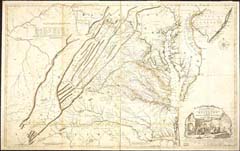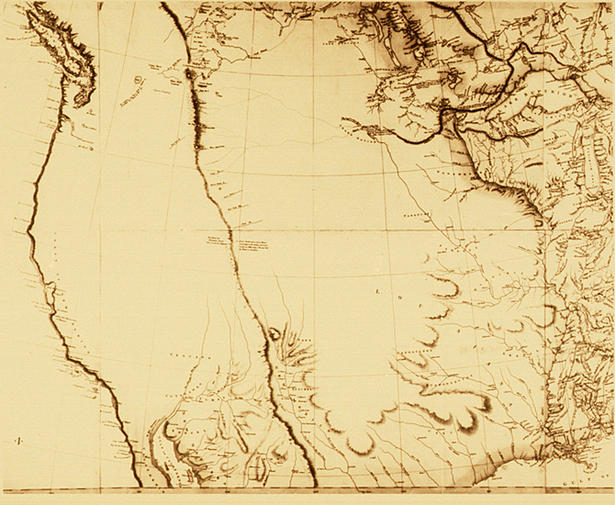Jefferson's Early Exposure to 'The West'
 1749 - Jefferson's father, Peter Jefferson, is one of the founding members of the Loyal Company, created to petition for grants of land west of the Allegheny Mountains. Other founding members were Joshua Fry, Thomas Walker, James Maury, and Thomas Meriwether, Meriwether Lewis's grandfather.
1749 - Jefferson's father, Peter Jefferson, is one of the founding members of the Loyal Company, created to petition for grants of land west of the Allegheny Mountains. Other founding members were Joshua Fry, Thomas Walker, James Maury, and Thomas Meriwether, Meriwether Lewis's grandfather.
1751 - Joshua Fry and Peter Jefferson complete their Map of the Most Inhabited Part of Virginia Containing the Whole Province of Maryland, which was the first map of Virginia created from actual surveys.
1753 - The Loyal Company plans an exploratory expedition up the Missouri River led by Thomas Walker, but abandons the enterprise due to the outbreak of the French and Indian War. Jefferson was ten years old at this time.
1758-60 - Following his father's death, Jefferson attends school at the Rev. James Maury's, who as a member of the Loyal Company was involved in the planning of the proposed western expedition.
1780s - In his Notes on the State of Virginia, Jefferson includes the Missouri, other western rivers, and points on western geography even though the Treaty of Paris of 1763 excluded the western territory as a part of Virginia.
Proposed Western Expeditions Before Lewis and Clark
1783 - Jefferson approaches George Rogers Clark to lead an expedition to explore the West provided the money can be raised. Clark declines but later suggests his youngest brother, William, "as well qualified almost for any business."
 1784 - Jefferson introduces in Congress the Ordinance of 1784, which set forth the principle that new states could be formed from the western territories and admitted to the Union on an equal basis with the original states.
1784 - Jefferson introduces in Congress the Ordinance of 1784, which set forth the principle that new states could be formed from the western territories and admitted to the Union on an equal basis with the original states.
1786 - While minister to France, Jefferson joins in a plan to support American explorer John Ledyard to travel eastward across Siberia, secure passage of a ship to some point on the western coast of North America, then travel east across the continent. Ledyard was arrested in Russia and sent back to Europe.
1793 - Jefferson enlists other members of the American Philosophical Society to sponsor André Michaux, a French botanist to "find the shortest & most convenient route of communication between the U.S. & the Pacific Ocean." The expedition was abandoned east of the Mississippi due to political intrigues. See Jefferson's instructions to Michaux.
Also in that year, Scottish native Alexander Mackenzie leads a small party from Fort Fork on the Peace River in Canada to the Straits of Georgia on the Pacific Ocean. In 1802, Jefferson obtains a copy of Mackenzie's account of the journey and is energized by the report of an easy mountain crossing and Mackenzie's call for Great Britain to claim the Columbia River for its own.
Other Explorations Sponsored During Jefferson's Presidency
1805 - The territorial governor of Louisiana, General James Wilkinson (who would later play a key role in the affair surrounding Aaron Burr's western intrigues), persuades President Jefferson to authorize an expedition to explore the headwaters of the Mississippi. General Wilkinson appoints Lieutenant Zebulon Pike to lead the party with orders to negotiate peace treaties with Native American Nations, to assert legal claim to the area, and to scout for potential military outposts. The party reached Lake Leech in Minnesota near the present-day Canadian border before returning.
1806 - Promoted to Captain, Pike is again appointed by General Wilkinson to lead an expedition to explore the Red and Arkansas Rivers from St. Louis. Pike enters Colorado where he unsuccessfully attempts to scale the mountain known today as Pike's Peak. Turning directions, Pike entered Spanish New Mexico. His party was arrested by Spanish authorities, escorted to the Louisiana border, and released in 1807.
Gaye Wilson
Monticello Research Department
June 2000
with amendments by Chad Wollerton
This essay initially appeared in the Summer 2000 edition of the Foundation's newsletter, Monticello.
